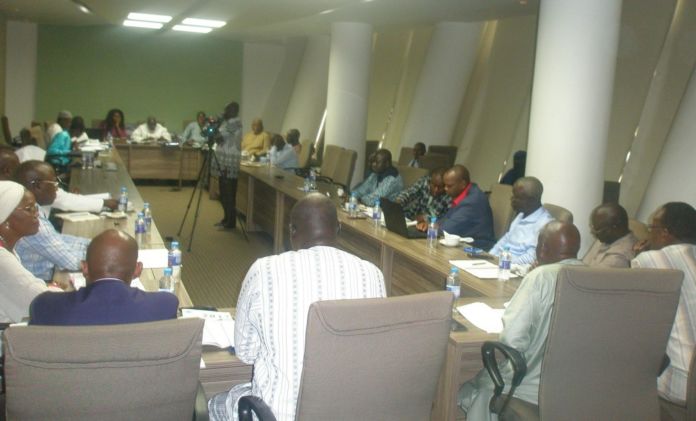By Momodou Jarju
The Gambia Civil Aviation Authority (GCAA) has called on the Government of The Gambia to transform loans contracted to them to equity, which will serve as finance for the institution instead, in order to ensure the institution is viable.
This was revealed by the director general of GCAA, Abdoulie F. Jammeh on Wednesday before the Public Enterprise Committee of the National Assembly. GCAA reappeared before PEC for engagement of its 2018 activity report and financial statement for possible consideration as mandated by law.
Mr. Jammeh was responding to a question raised by Hon. Saikou Marong, a member of the select committee about the loan it owes to Social Security and Housing Finance Corporation (SSHFC) amounting to over 90 million dalasis.
Jammeh said the fact remains that they did not request for the loan and they were unaware of its discussion.
“This wasn’t the loan contracted on our own volition. In fact we were not in the picture up to the tail end of it. These were equipment purchased by the Government of The Gambia, principally by State House, not because we specifically requested for them and most of what they provided is not suitable for airport use apart from the two strikers. And then they are unsolicited and we got to a point when we have to reach an agreement with Social Security, in fact the total value was more than that. I think the Government pay for something, part of it was supposed to go to the Fire {Rescue} Service and then the rest was for us,” he said.
He said the bulk of the cost of the equipment was dumped on them to pay but they told the government that their cash flow could not even sustain the repayment for the longest time and that they couldn’t even agree on repayment plan.
Jammeh however said at the moment, they have signed an agreement with SSHFC to pay a certain amount monthly to amortize – to pay back– the loan fully. He added that they’ve already started repaying the loan.
Hon. Marong, also asked the authority to explain the huge difference on Loss Before Tax between 2017 (i.e. -203,833,000.00) and 2018 (i.e. -422,109,000.00); and the Loss For The Year between 2017 (i.e. -209,097,000.00) and 2018 (i.e. -427,356,000.00).
DG Jammeh said this is as a result of the exchange rate losses, noting for instance a dollar equal about D50. He said the only year they were able to make profit was when government unilaterally pegged the exchange rate between the dollar and the dalasi in 2015. He said they made a profit of about 23 million dalasis.
“So as long as we cannot control the exchange fluctuation, these translation losses will appear. And they account for the biggest chunk of our loss,” he said.
Nonetheless, when asked whether the exchange difference will not render the institution unviable, Mr. Jammeh responded in the positive. He said unless it is taken out completely and the loans are taken as equity contribution, the institution could become unviable.
Mr. Jammeh added that every year, with the losses accumulating it is eating away their reserve. He said it a proven fact, on an established study, that an international airport can only break even if it is able to possess 500,000 passengers yearly. Jammeh said they are not hitting that number, while adding that the matter is more of a political decision and not a managerial decision. In 2018, the passengers at Banjul International Airport recorded close to half a million (D406,029,000.00).
“Unless Government takes that decision in order to transform those liabilities into equity, this situation will continue this way,” he said.
Chair of the committee, Hon. Halifa Sallah said GCAA continued to highlight the importance of ensuring that loans contracted before the existing board would continue to impair on the viability of the authority.
“This would ultimately lead to the collapse of the institution as a growing concern. It is emphasized throughout that something ought to be done to clear the loans and there is a scheme of transforming it into equity so that the institution will now enter into some form of partnership with the existing government and that is something that we need to look into in terms of the reform of the Public Enterprise Act,” Sallah, who is also Serrekunda deputy said.
Hon. Sallah also drew the attention of the institution’s board on the advantage of presenting 2019 activity report and financial statement by 31 March, 2020, which is the due date, so that the committee would be able to take the rest of the year in dealing with the challenges the authority put before them for them to be addressed.
Meanwhile, the select committee has adopted the activity report and financial statement of GCAA for the year under review 2018.




















